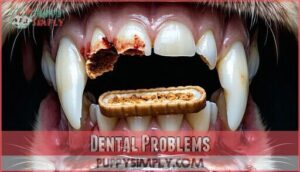This site is supported by our readers. We may earn a commission, at no cost to you, if you purchase through links.

While one small piece probably won’t send your pup to the emergency vet, these cookies contain high sugar, artificial ingredients, and preservatives that aren’t part of a healthy canine diet.
The combination of processed sugars and wheat can upset your dog’s stomach and contribute to obesity or diabetes over time.
Just like you wouldn’t want to live on cookies alone, your four-legged friend needs proper nutrition rather than sweet treats.
The figs themselves aren’t the main problem—it’s everything else packed into these processed snacks.
Discover which fig-based alternatives might actually benefit your dog’s health instead.
Table Of Contents
- Key Takeaways
- Dog Fig Newton Risks
- Can Dogs Eat Fig Newtons
- Fig Newton Ingredients
- Health Risks for Dogs
- Safe Alternatives for Dogs
- Feeding Guidelines for Dogs
- Dog Nutrition and Safety
- Frequently Asked Questions (FAQs)
- What happens if dogs eat fig newtons?
- What human cookies are safe for dogs?
- Are fig Newtons safe?
- Is it safe to give Fig Newtons to puppies?
- Are there any long-term health effects of Fig Newtons?
- What other foods should be avoided if my dog is allergic to figs?
- Is there a difference between Fig Newtons and plain figs nutritionally?
- Is it possible to give too many figs to a dog?
- Do Fig Newtons affect dogs behavior?
- How long do Fig Newton symptoms last?
- Conclusion
Key Takeaways
- Fig Newtons aren’t toxic to dogs in small amounts, but they contain high sugar content (about 12g per cookie), artificial ingredients, and preservatives that can harm your dog’s health over time.
- Regular consumption of Fig Newtons can lead to serious health issues for your dog including obesity, diabetes, dental problems, and digestive upset like vomiting and diarrhea.
- The ingredients in Fig Newtons, such as wheat flour, soybean oil, and artificial preservatives, can trigger allergic reactions in some dogs, ranging from skin irritations to breathing difficulties.
- Instead of Fig Newtons, you’ll keep your dog healthier by offering safe alternatives like fresh figs in small amounts, dog-specific treats, or homemade options like sweet potato chews and pumpkin bites.
Dog Fig Newton Risks
You’ll want to think twice before sharing your Fig Newtons with your furry friend, as these cookies contain high sugar levels, artificial ingredients, and preservatives that can harm your dog’s health.
The combination of these harmful components can lead to diabetes, obesity, digestive issues, and even potential gossypol poisoning from the hydrogenated cottonseed oil.
High Sugar Content
Anyone offering Fig Newtons to their dog should know about their dangerous sugar content. A single cookie contains approximately 12 grams of sugar—far too much for your canine companion.
This sugar overload creates serious health concerns, including:
- Triggers immediate hyperactivity followed by energy crashes
- Contributes to long-term weight gain and obesity risks
- Damages dental health, leading to painful tooth decay
- Increases diabetes risk, especially in older or predisposed dogs.
This is because brown sugar is harmful to dogs, potentially leading to digestive issues.
Artificial Ingredients
Manufacturers pack Fig Newtons with artificial ingredients that can harm your furry friend.
These chemical additives pose significant health risks for dogs.
| Ingredient Type | Effect on Dogs | Risk Level |
|---|---|---|
| Artificial Colors | Allergic reactions | Moderate |
| Synthetic Preservatives | Digestive upset | High |
| Flavor Enhancers | Nervous system issues | Moderate |
Poor ingredient sourcing and unhealthy ingredients like BHT and sodium benzoate increase toxicity risks, compromising pet safety beyond just sugar concerns.
The use of these ingredients can lead to serious health issues, making it crucial for dog owners to be aware of the potential health risks.
Choking Hazards
Beyond chemical concerns, Fig Newtons present physical risks too.
Beyond chemical concerns, Fig Newtons present physical risks that can transform a sweet treat into a dangerous situation for your dog.
Their cookie size and dense texture make them a serious choking hazard for dogs, especially smaller breeds who might try to swallow pieces whole.
To prevent choking, always supervise feeding and break treats into tiny portions.
Know emergency actions like the canine Heimlich maneuver—those few seconds of preparation could save your dog’s life if a treat goes down wrong.
Can Dogs Eat Fig Newtons
While Fig Newtons aren’t immediately toxic to dogs in small amounts, they’re far from an ideal treat for your furry friend. You might be tempted to share this sweet snack, but responsible indulgence requires understanding the risks involved.
Fig Newtons contain high sugar levels and several artificial ingredients that can negatively impact your dog’s health over time. The long-term effects of feeding these cookies regularly include weight gain, dental problems, and potential digestive issues.
As with many human treats, artificial sweeteners are toxic, so always check the ingredient list. If you’re wondering "are fig newtons safe for dogs," the simple answer is that they should only be given on rare occasions, if at all.
Most veterinarians recommend avoiding them completely due to ingredient concerns and nutritional value that doesn’t benefit canine health. Before sharing any human food with your pet, consider the potential fig newton risks for dogs.
Fig Newton Ingredients
You’ll find that Fig Newtons contain several ingredients that aren’t ideal for your furry friend, including whole grain wheat flour, corn syrup, artificial flavors, and preservatives like sodium benzoate.
These ingredients can contribute to health problems in dogs, as they’re high in sugar and contain processed additives that dogs’ digestive systems aren’t designed to handle, leading to issues with health problems.
Wheat Flour
Now that you know whether dogs can eat Fig Newtons, let’s examine what’s actually in them.
Whole grain wheat flour is a primary ingredient in Fig Newtons that can cause problems for your furry friend.
- Dogs with wheat allergies may experience itching, digestive upset, or ear infections
- Gluten sensitivity isn’t common in dogs but can occur in certain breeds
- Wheat flour offers minimal nutritional value compared to what your dog needs, which is a key point to consider when thinking about your dog’s dietary needs.
Soybean Oil
After examining wheat flour, let’s look at another key ingredient: soybean oil.
Found in Fig Newtons, this oil helps create that soft texture you’re familiar with.
While soybean oil contains beneficial fatty acids for humans, it’s not ideal for your dog’s diet.
Processing methods can strip away nutritional value, and some dogs may experience allergen concerns.
When checking dog food labels, consider healthier oil alternatives that better support your pet’s health.
Added Sugars
While soybean oil poses concerns, the added sugars in Fig Newtons present an even greater threat to your dog’s health.
These cookies contain multiple sweeteners including sugar, corn syrup, and invert sugar—creating a potential sugar overload for your furry friend.
High sugar content substantially increases risks of dog diabetes and obesity.
Even small amounts of these hidden sugars can impact your dog’s health negatively, making Fig Newtons a treat best avoided.
Preservatives
While added sugars are concerning, preservatives in Fig Newtons raise their own red flags.
Ingredients like sodium benzoates and sulfur dioxide may lead to preservative toxicity or sulfite sensitivity in dogs.
These additives can upset your pup’s stomach or even impact long-term pet health.
- Risk of preservative toxicity
- Sulfite sensitivity side effects
- Artificial flavors affecting digestion
- Limited safe limits for dog health
Health Risks for Dogs
Regarding Fig Newtons, their high sugar, artificial ingredients, and preservatives can spell trouble for your dog’s health.
These treats may seem harmless, but they can lead to issues like obesity, diabetes, and digestive problems over time, which can be a result of their artificial ingredients.
Obesity and Diabetes
Feeding Fig Newtons to dogs can lead to pet obesity and dog diabetes due to their high sugar content and artificial sugar additives.
Excessive weight gain impacts energy, exercise needs, and overall health.
Spikes in blood sugar levels from these treats increase insulin resistance, causing long-term dietary impacts.
Prioritizing preventative measures guarantees healthier weight management and avoids unnecessary risks to your dog’s well-being.
Digestive Issues
Fig Newtons can wreak havoc on your dog’s digestion.
Their sugary, processed ingredients might cause vomiting, diarrhea, and abdominal pain, leading to gastrointestinal upset.
Some dogs may experience lethargy or irritated skin if sensitive.
While a single crumb mightn’t hurt, it’s better to avoid these snacks altogether.
Owners should be aware of common pet issues to maintain their animal’s health.
Stick to dog-safe treats to keep digestion smooth and tails wagging, and avoid snacks that can cause lethargy.
Dental Problems
Sweet snacks like Fig Newtons may seem harmless, but their sugars impact your dog’s dental health.
High sugar promotes plaque buildup, tartar control becomes harder, and gum disease or bad breath can follow.
Stick to dog treats designed for canine health to protect their teeth.
- Sugars encourage tooth decay
- Causes plaque buildup
- Increases gum disease risk
- Leads to bad breath
- Tartar becomes harder to control
Allergic Reactions
Beyond dental concerns, allergic reactions pose dog health risks.
Ingredients in Fig Newtons, like soybean oil or wheat, can trigger skin irritations, vomiting symptoms, or breathing difficulties in dogs with allergies.
In rare cases, anaphylactic shock may occur, and allergen identification is key—monitor your pet closely after consumption to protect your pup’s health.
Stick to safe treats to avoid toxic ingredients and ensure the well-being of your dog.
Safe Alternatives for Dogs
You don’t have to rely on Fig Newtons to treat your dog—plenty of safe alternatives exist.
Fresh fruits like figs (in small amounts) or dog-friendly treats made specifically for pets are healthier and more nutritious options.
Fresh Figs
Fresh figs can be a safe and nutrient-rich snack for your pup if you follow simple guidelines—think moderation and preparation.
They’re packed with fiber, potassium, and magnesium. Remember to remove stems and chop into bite-sized pieces.
- Boosts digestion with natural fiber
- Provides essential vitamins and minerals
- Serves as a healthy, low-sugar treat
- Avoids harmful additives in processed snacks
- Offers a fresh alternative for pet safety
Dog-Friendly Treats
If your dog’s curious nose can’t resist snacks, safer options exist.
Dog-friendly treats balance taste and health without risky ingredients.
Check out these:
| Treat Type | Benefits |
|---|---|
| Carrot sticks | Low-calorie, crunchy chew |
| Sweet potato chews | High fiber, satisfy cravings |
| Apple slices | Fresh, natural sweetness |
| Dog biscuits | Perfectly portioned, safe |
For ideal canine health, consider safe, palatable options.
Choose treats that prioritize your pup’s nutrition and provide healthy alternatives.
Homemade Options
Why not try making your own healthy dog snacks at home? Homemade treats guarantee you control every ingredient for safe snacks your pup can enjoy.
Here are five ideas:
- Oat and peanut butter biscuits
- Sweet potato chews
- Pumpkin and banana bites
- Carrot and apple cookies
- DIY recipes with dog-friendly ingredients
Consider exploring options for homemade dog treats for more variety. Store these alternative dog treats properly to ensure they remain safe for your pup.
Feeding Guidelines for Dogs
In regards to treating your dog, keeping portions small and occasional is key.
Always monitor their reaction after trying new foods, and check with your vet to confirm it’s safe for their specific needs.
Portion Control
When offering treats like Fig Newtons, keep serving size small and infrequent.
Size matters—tiny pieces suit small dogs, while larger breeds handle slightly more.
Serving frequency should stay low, as high sugar content can increase health risks.
Consider age and activity levels; older or less active dogs need stricter moderation.
Treat calorie limits help prevent weight issues.
It is essential to remember that size matters when determining the appropriate serving size for dogs.
Monitoring Reactions
After letting your dog sample fig newtons, keep a close eye on their behavior.
Watch for initial symptoms like digestive distress, allergic signs, or unusual behavioral changes. Even small reactions can signal dog health issues linked to fig newtons dogs.
Are fig newtons bad for dogs long-term? Likely, yes. Be cautious, and if needed, plan a veterinary follow-up.
Establishing a feeding routine can also aid in monitoring your dog’s appetite and overall health, so you can identify potential issues early on by tracking weight and behavior. This helps in recognizing unusual behavioral changes and digestive distress to ensure your dog’s well-being, making it crucial to be aware of the potential long-term effects and take necessary precautions to prevent allergic signs.
Veterinary Consultation
When considering fig newtons for your dog, always consult your vet.
Dietary changes can affect dogs differently based on breed specifics and underlying conditions.
Veterinary advice guarantees personalized nutrition and prevents risks like fig newton toxicity, obesity, or pet poisoning.
In emergency situations, prompt veterinary advice can save lives.
Protect your furry pal’s health by prioritizing professional guidance!
Dog Nutrition and Safety
You want to make sure your dog gets treats that are both safe and nutritious.
Understanding what’s in their food and how it affects them is a key part of being a responsible pet owner.
Nutritional Needs
Keeping your dog’s nutritional needs in check means focusing on a balanced diet with proper calorie intake and essential nutrients.
Fig Newton ingredients lack dietary fiber and hydration benefits dogs need. While tempting, feeding Fig Newtons regularly offsets dog nutrition.
Stick to wholesome options supporting digestion and energy, ensuring longer, healthier lives without the dog health risks Fig Newtons pose, which can affect your dog’s overall healthier lives.
Toxic Ingredients
Fig Newtons contain toxic ingredients that could harm your dog.
Watch for these culprits:
- Hydrogenated oils: Linked to Gossypol Poisoning, which affects your dog’s heart and kidneys.
- Sulfites: Dangerous preservatives that trigger allergic reactions and skin issues.
- Artificial flavors and benzoates: These can upset digestion, causing vomiting or diarrhea.
Avoid fig newton toxicity dogs can’t afford!
Healthy Treat Options
The best healthy treat options for your dog go beyond store-bought alternatives.
Instead of Fig Newtons, try these vet-recommended options:
| Treat Type | Benefits | Serving Size |
|---|---|---|
| Blueberries | Antioxidants, low calorie | 2-3 small berries |
| Carrots | Dental health, fiber | 1-2 baby carrots |
| Homemade biscuits | Controlled ingredients | 1 small treat |
| Sweet potato | Vitamins, digestibility | 1-inch cube |
Remember, balanced nutrition means treats shouldn’t exceed 10% of daily calories.
Consider offering your pet wholesome, nutritious snacks for ideal health and a healthy lifestyle with wholesome habits.
Pet Owner Responsibilities
Now that you know about healthy treats, let’s talk about your role in keeping your pup safe and healthy.
Your pet’s health depends on:
- Regular exercise paired with responsible feeding habits
- Consistent training to prevent begging for human snacks
- Preventative care including dental check-ups
- Mental stimulation through appropriate toys, not food rewards
Remember, avoiding unhealthy ingredients like those in Fig Newtons is just one part of good pet parenting. As a pet parent, you’re responsible for every morsel that goes into your dog’s mouth, which requires regular exercise and consistent training.
Frequently Asked Questions (FAQs)
What happens if dogs eat fig newtons?
Dogs that eat fig newtons may experience digestive upset, vomiting, or diarrhea due to high sugar content.
Regular consumption can lead to obesity, diabetes, and potential harm from artificial ingredients.
You’ll want to avoid them.
What human cookies are safe for dogs?
Plain butter cookies and sugar cookies are occasionally safe in tiny amounts, but you’re better off choosing treats made for your furry friend.
Human cookies contain too much sugar and fat for dogs.
Are fig Newtons safe?
Fig Newtons aren’t safe for your dog.
They contain high sugar, artificial ingredients, and potentially harmful oils that can cause digestive issues, obesity, and other health problems.
Stick to dog-specific treats instead.
Is it safe to give Fig Newtons to puppies?
With 12 grams of sugar per cookie, Fig Newtons aren’t safe for puppies.
Their developing systems can’t handle the high sugar content, artificial ingredients, and preservatives.
You’ll want to stick with puppy-specific treats instead.
Are there any long-term health effects of Fig Newtons?
Regular consumption of Fig Newtons can lead to obesity, diabetes, and dental issues in your dog due to high sugar content.
They also contain ingredients that may cause long-term digestive problems and nutritional imbalances.
What other foods should be avoided if my dog is allergic to figs?
If your dog is allergic to figs, you should avoid fruits in the mulberry family like mulberries and jackfruit.
Also watch for persimmons, dates, and some berries that might trigger similar reactions.
Is there a difference between Fig Newtons and plain figs nutritionally?
Yes, there’s a substantial difference.
Plain figs are natural with healthy fiber and nutrients, while Fig Newtons contain added sugars, preservatives, and processed ingredients.
You’re better off giving your dog small amounts of fresh figs instead, as they are a more natural option.
Is it possible to give too many figs to a dog?
Picture a tiny fig mountain towering over your pup.
Yes, you can definitely give too many figs to a dog.
They’ll cause digestive upset, and the high sugar content can lead to obesity and diabetes.
Do Fig Newtons affect dogs behavior?
Fig Newtons’ high sugar content can cause temporary hyperactivity in your dog.
You’ll notice increased energy levels, potential restlessness, and difficulty focusing – similar to sugar rushes in children.
These behavioral changes typically subside as sugar metabolizes.
How long do Fig Newton symptoms last?
Nearly 80% of canines experience digestive symptoms for 24-48 hours after consuming sweet treats.
You’ll notice your pup’s vomiting, diarrhea, and lethargy typically resolve within two days if they’ve eaten only small amounts.
Conclusion
Imagine your dog sneaking a Fig Newton off the coffee table—harmless, right?
While a single cookie likely won’t hurt, regularly feeding Fig Newtons to dogs can lead to obesity, diabetes, and upset stomachs due to their high sugar and artificial ingredients.
Instead of these processed snacks, stick to dog-safe options like fresh figs or vet-approved treats.
Your pup’s health depends on your choices, so skip Fig Newtons and focus on nutritious, safe alternatives for a happy, healthy companion, ensuring a long and healthy life.


















